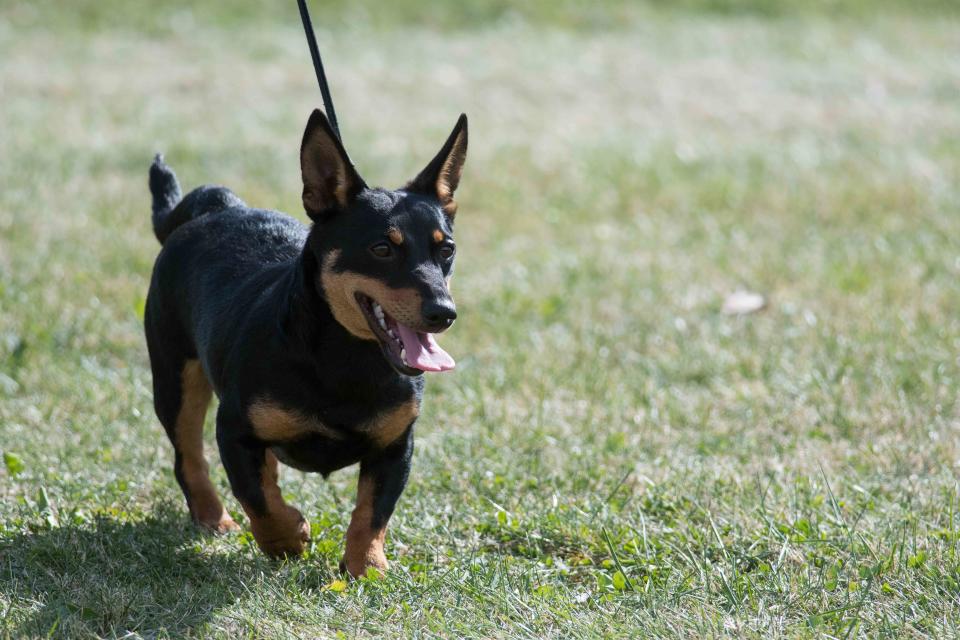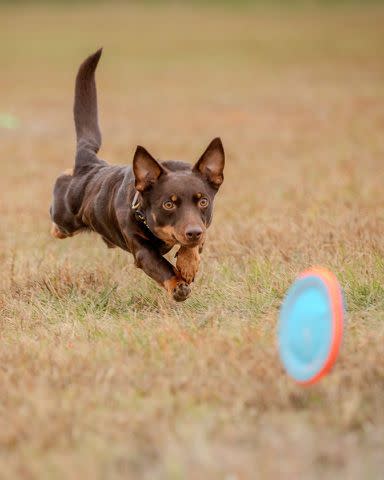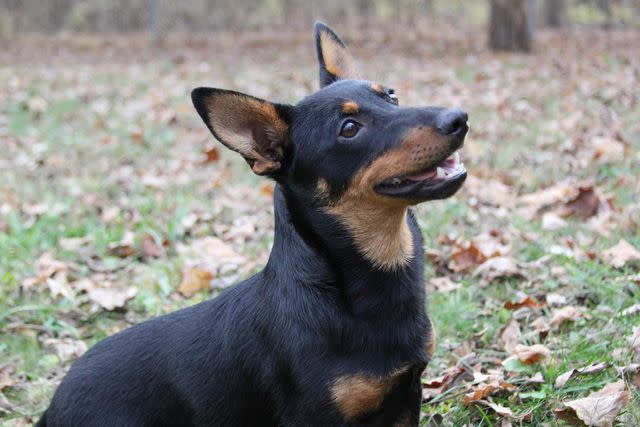Lancashire Heeler: Dog Breed Characteristics & Care
History, Care Tips, and Helpful Information for Pet Owners

Kyle Reynolds / Getty Images
The Lancashire heeler is a small herding breed originally from England. They are the smallest heelers in the world with a short, dense coat in black and tan or liver and tan. Known for their signature "heeler smile," affectionate demeanor, and unwavering devotion to their family, the Lancashire heeler is an all-around charming breed that's bound to win the hearts of many.
Learn more about the Lancashire heeler's characteristics, history, and care needs.
Breed Overview
Group: Herding
Height: 10 to 12 inches
Weight: 9 to 17 pounds
Coat: Short double coat
Coat Color: Black and tan or liver and tan
Life Span: 12 to 15 years
Temperament: Affectionate, loyal, intelligent, playful
Hypoallergenic: No
Origin: England
Characteristics of the Lancashire Heeler
The Lancashire heeler is a little dog with a lot of heart. They have an ever-so loving, hardworking, and loyal personality and are great with children and other pets. A Lancashire heeler is at their happiest when they have a human or furry companion to keep them company and a job to do. In households with small children, it's advised to show them how to gently interact with small dogs like the Lancashire heeler and supervise their interactions at all times.
Sheryl Bradbury, president of the United States Lancashire Heeler Club (USLHC), says the Lancashire heeler’s claim to fame is their versatility. They can do just about anything and are thrilled to tag along wherever you go, whether it’s from the couch to the kitchen, running errands around town, or going out for camping trips. Simply put, they can't get enough of their favorite person and enjoy doing anything as long as it's with them.
Lancashire heelers are adaptable in any living situation as long as they have enough space to play and exert their energy. They're sure to let you know how they're feeling with vocalizations, no matter whether excited or frustrated. And while they do bark, it's not constantly or without reason.
Affection Level | High |
Friendliness | High |
Kid-Friendly | High |
Pet-Friendly | High |
Exercise Needs | High |
Playfulness | High |
Energy Level | High |
Trainability | High |
Intelligence | High |
Tendency to Bark | High |
Amount of Shedding | Medium |
History of the Lancashire Heeler
The Lancashire heeler's exact origin is unknown and varies by source. Short-legged, sable and black dogs are depicted in Futhark and Runic symbolization and artwork dating from the 9th through the 12th century. It's believed that the Lancashire heeler's possible ancestors are the Cardigan Welsh corgi and Manchester terrier and that their history can be traced back to the 17th century as working dogs on farms in Lancashire, a country in North West England. They were developed as excellent cattle herders, ratters, and companions and still work on farms today.
In 1981, The Kennel Club in the United Kingdom recognized the Lancashire heeler, also known as the "Ormskirk heeler" or "Ormskirk terrier." The Lancashire heeler was moved into the club's Pastoral Group and won challenge certificates for the first time in 1999. In the same year, liver and tan Lancashire heelers were officially approved to be in the breed standard.
Meanwhile, the interest in Lancashire heelers was growing in the United States. The breed joined the AKC Foundation Stock Service in 2001. The USLHC was formed in 2007 to promote Lancashire heelers in the U.S. and inform owners and future owners of these lovable little drovers. Then, the Lancashire heeler was approved to compete in the AKC's Miscellaneous Class with a Herding Group designation in 2018.
After years of working effortlessly to earn full AKC recognition for the breed, it was officially recognized as the 201st breed by the AKC and the newest member of the Herding Group on January 1, 2024.
Lancashire Heeler Care
Like other cattle dog breeds, Lancashire heelers are busy bees by nature. Smart, energetic, and alert, these dogs are committed both as companions and workers and are at their best with plenty of exercise and training. While they're not considered to be hypoallergenic, their coats are fairly low-maintenance, requiring minimal grooming.
Exercise
Due to their hardworking heritage as herders, Lancashire heelers are active and ambitious little dogs. Bradbury says these dogs can do just about anything—from playing fetch with a tennis ball and walking around the yard to practicing agility and going out for hikes. She recommends that Lancashire heelers get anywhere between 30–60 minutes of daily exercise. A fenced-in yard is advisable, as they're driven to herd and can wander off.

Sheryl Bradbury
Lancashire heelers like to keep busy and can stay physically and mentally stimulated with various types of exercises (e.g. running, swimming, walking), dog sports, games, interactive toys, and training. Whatever the opportunity, a Lancashire heeler is eager to put their mind and body to work.
"Any activity that people can do, they're doing with this breed—including those that aren't in AKC events, UKC events, and so on," Bradbury says. "...When we describe this breed, they're the most versatile breed that exists."
Grooming
The Lancashire heeler has a short, dense double-coat that can be groomed at home. This breed sheds year-round and should be brushed at least once a week using a shedding blade or bristle brush. They blow coat in the fall and spring and will require more frequent brushing to help reduce shedding. Bathe your dog on a monthly or bimonthly basis depending on how often it's necessary.
In addition to brushing your Lancashire heeler's coat regularly, it's essential to brush their teeth daily and trim their nails monthly.
Training
Lancashire heelers are extremely trainable and can be trained right away, Bradbury says. These dogs are brilliant and want to make their people happy. Though they can be a bit willful, they thrive with positive, reward-based training. Keep training sessions fun and engaging to hold their interest and prevent boredom. With patience, consistency, and treats, you'll find that Lancashire heelers can excel in obedience, agility, rally, herding, scent work, and so much more.
Because Lancashire heelers can be naturally cautious of strangers, it's best to socialize them early on and expose them to new people and pets. When making introductions, take it at your heeler's pace to build their comfort and confidence and ultimately have positive social interactions.
Common Health Problems
The Lancashire heeler is known to be a very healthy breed. However, just like with any other dog breed, there are some potential hereditary health problems to look out for. These may include:
Primary lens luxation (PLL)
Collie eye anomaly (CEA)
Before purchasing a Lancashire heeler, ask a breeder for proof of the required tests for the conditions listed above, as these are necessary for a Canine Health Information Center (CHIC) in the Orthopedic Foundation of America (OFA) database.

Sheryl Bradbury
Diet and Nutrition
Like all dog breeds, the Lancashire heeler should be fed a high-quality, well-balanced diet that’s appropriate for their life stage. Bradbury recommends talking with your dog’s breeder to learn about their diet if you wish to continue feeding them on that specific diet. While feeding two measured meals per day is typical, you can adjust your Lancashire heeler’s feeding schedule to your routine.
Since these small dogs can be prone to unwanted weight gain, limit treats to no more than 10 percent of their daily calories. Additionally, make sure fresh, clean water is always accessible for your Lancashire heeler.
If you have any questions on how to choose the right dog food for your Lancashire heeler, it’s best to consult a veterinarian to learn more about the most beneficial options based on their age, health, activity levels, and individual needs.
Where to Adopt or Buy a Lancashire Heeler
Due to the Lancashire heeler’s high-demand and rarity with about 5,000 available worldwide and only about 400 available nationwide, this isn’t a breed you’ll find in the shelters, Bradbury says.
If you’re considering purchasing a Lancashire heeler, you may have to join a waitlist or travel when you come across a puppy available through a responsible breeder. According to Bradbury, Lancashire heeler puppies currently cost between $1,800 and $2,500. At this time, there are no Lancashire heeler rescues in the United States.
For more information to help you find a Lancashire heeler, visit:
The USLHC (Contact the club for a list of USLHC member breeders or breeders located outside the U.S. if interested in importing.)
Lancashire Heeler Overview
The Lancashire heeler is a fun-loving breed that craves companionship and can make an excellent family pet. These pooches are intelligent, athletic, and eager to please. However, they require constant socialization, can be very vocal, and are considered to be power chewers.
Pros of the Lancashire Heeler
Extremely versatile
Loving and devoted to their family
Highly intelligent
Cons of the Lancashire Heeler
Requires plenty of physical activity and mental enrichment
Can be vocal
May engage in destructive behavior if bored or left alone
14 Best Black-and-Tan Dog Breeds
More Breeds and Further Research
Before deciding whether the Lancashire heeler is right for you, be sure to do plenty of research on the breed to learn if it's compatible with your lifestyle. Talk with Lancashire heeler owners, reputable breeders, and veterinary professionals for more information.
If you’re interested in similar breeds, check out:
There’s a whole world of potential dog breeds out there—with a little research, you can find the right one to bring home.
Frequently Asked Questions
Are Lancashire heelers good pets?
Yes! Lancashire heelers are wonderful companions who love to be around their family—both human and canine. With sufficient daily exercise, mental stimulation, and consistent and positive, reward-based training, Lancashire heelers can be excellent pets.
Do Lancashire heelers bark a lot?
Lancashire heelers can be very vocal. However, it's not common for them to bark for no reason or constantly. If they do, it could be due to separation anxiety or boredom. Lancashire heelers are quick to learn and can be trained to bark on cue as a means to teach them when it's OK to do so.
How much do Lancashire heelers cost?
At this time, Lancashire heeler puppies cost between $1,800 and $2,500 from a reputable breeder.
Read the original article on The Spruce Pets.

